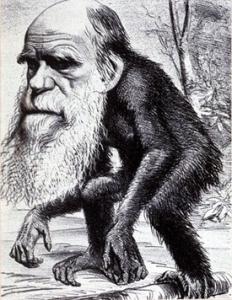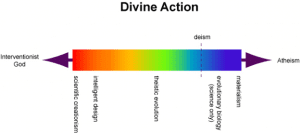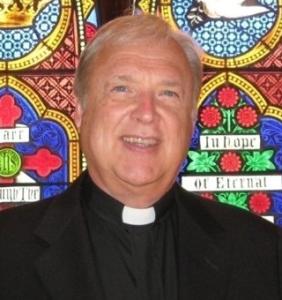Evolution and Religion:
Should Christians dump Darwin? No. 
SR 1015
There is no war between faith and science, but the Christian faith is still losing. Here’s why. Science is intelligible. Faith is not intelligible. The puddles surrounding faith’s relation to science are muddy. Or so it appears. Let’s see if we can clear up some mud.
Actually, the so-called war between faith and science lacks intelligibility simply by calling it a war. “War” suggests 2 adversaries. There’s a war going on, to be sure: but we can list at least 5 adversaries: creationism, intelligent design (ID), theistic evolution, science only, and materialism (scientism, atheism).
When it comes to the topic of evolution and religion, Evangelical Christians are quite familiar with creationism and ID, which affirm that God intervenes (miraculously?) in the origin and history of life. At the other end of the spectrum, the materialists believe there is no God to intervene. In the middle, the theistic evolutionists affirm that God works in, with, and under evolutionary processes without intervention. Like Switzerland and Sweden, research scientists in the laboratory typically stay out of the fight. Now, in which army do you want to fight? Examine this diagram by my colleague, Martinez Hewlett. (Peters 2005, Diagram)

Creationism and Intelligent Design
The commander of the creationist army has been the late Henry Morris (1918-2006). “Creation is true, evolution is false, and real science confirms this” (Morris 1993, 308-309). What you don’t hear in this battle cry is what Dr. Morris assumes, namely, it is for scientific reasons—not biblical or theological reasons—that Charles Darwin’s theory of evolution is false. Dr. Morris is not anti-science. He actually earned a Ph.D. in hydrology from the University of Michigan.
Here is the decisive point that the media and scoffers miss: the scientific creationist believes he or she is pursuing good science. Evolutionary theory, creationists hold, falls short of measuring up to genuine scientific standards. One can be a creationist and object to evolution while still engaging in all the other sciences: mathematics, physics, biology, and such.
This observation applies as well to the Intelligent Design (ID) school of thought. “The case for intelligent design, like other scientific theories, is based upon empirical evidence, not religious dogma,” says ID spokesperson Stephen C. Meyer (Meyer 2009, 403). Therefore, it muddies the waters to dismiss supporters of creationism and ID as Bible thumping literalists who are anti-science.
True Science versus Scientism
So, why is it so widely believed that creationists and ID’ers are anti-science? Here is where the confusion lies: both creationists and ID’ers are opposed to materialism. Materialism looks like science, but it’s actually an ideology that claims science as authority. The problem is not science. Rather, it’s scientism in the form of atheistic materialism that claims science for support.
“Scientism is the philosophical notion which refuses to admit the validity of forms of knowledge other than those of the positive sciences,” says Pope and now Saint, John Paul II; “and it relegates religious, theological, ethical, and aesthetic knowledge to the realm of mere fantasy” (Pope 1998). Persons of faith and research scientists as well eschew scientism while embracing science itself. Once this is clear, the muddy water will begin to clear.
Make no mistake, I do not hold membership in either the creationist or ID clubs. But unless we understand their self-understanding, we will fail to grasp one indubitable fact: no one in the war over Darwin is anti-science.

Theistic Evolution
I attend the BBQs of the theistic evolutionists, especially picnics that include writers of the Clergy Letter Project who sponsor Evolution Weekend each February. Why? Because the evolutionary framework is so widely accepted by our working scientists that it would be irrational to sidestep it. Faith ‘n’ science complement one another like burgers ‘n’ fries.
To be clear on another point: I don’t recommend that Christians swallow Darwinian evolution without a thorough mastication. I do not recommend we make evolution into a 4th article in our trinitarian creeds. One need not believe in evolution. Nevertheless, a person of faith can honestly rely on evolutionary concepts to explain Mother Nature’s history.
To say it another way, I do not ask creationists or ID’ers to convert to evolution. Evolution is in no way an article of faith. Nevertheless, it would do well for creationists and ID’ers to suspend judgment momentarily and embrace the evolutionary framework as a hypothesis.
Even the hypothesis of natural selection is illuminative of the data. What Theodosius Dobzhansky said in 1973 applies still today: “Nothing in biology makes sense except in the light of evolution” (Dobzhansky 1973). Even prominent evangelical geneticist Francis Collins synthesizes his belief in Jesus Christ with Darwinian evolution. “No serious biologist today doubts the theory of evolution to explain the marvelous complexity and diversity of life” (Collins 2006, 99).
As an aside, Oxford University’s Celia Deane-Drummond would correct my vocabulary: “Theistic evolution…is more accurately a theology of evolution” (Deane-Drummond 2009, 26). Regardless of what we call our school of thought, here is what is key: for the Christian faith seeking understanding within the framework of the world of science, evolutionary categories pave a road for faith to follow toward construction of an intelligible worldview (Biologos n.d.) (Project n.d.).
Christian Love for the Unfit
Christian hostility toward evolution should not be directed toward the laboratory scientist or field researcher. Or even Darwin, for that matter. But, there is a problem that prevents us from swallowing evolution like we swallow our morning vitamin pills. What is that problem? Natural evil.
A problem the Christian theologian should identify in public discourse is this: the story of nature Darwin tells is filled with violence in the struggle for life. The predator and prey conflict is blood “red in tooth and claw,” as poet Alfred Lord Tennyson rightly observed (Tennyson 1850, Canto 56). It follows, therefore, that society should not construct an ethic based upon evolutionary principles, especially survival-of-the-fittest. Christian morality inspires love for the unfit.
Christian morality based on the example of Jesus does not celebrate the victory of the bully over the slain, the eater over the devoured, the new species over the extinct. Rather, Christian morality cares for the weak, the lame, the diseased, the victims of the bully. When it comes to the survival-of-the-fittest, the Christian’s attention is drawn compassionately toward the unfit.
Conclusion
On the topic of evolution and religion, should Christians dump Darwin? No.
Let’s take as a motto 1 Peter 3:15: “In your hearts revere Christ as Lord. Always be prepared to give an answer to everyone who asks you to give the reason for the hope that you have. But do this with gentleness and respect.”
With this motto in mind, Christian Sunday School teachers and systematic theologians should clear the muddy water. Only if the water is clear can people of faith make their faith intelligible. Make clear the following:
- There is no war between science and faith, because nobody is anti-science. Those who scoff at Christian faith do not represent science; they represent scientism–the ideology of materialism.
- No one needs to treat evolution as an article of faith, even though everyone needs to treat evolution as a protean scientific theory.
- Some theologians among us—theistic evolutionists in particular—produce intelligible and insightful explications of the gospel within a scientific framework(Project, Evolution Weekend n.d.).
- Christians should object strenuously to any attempt to construct a social ethic based on nature’s example of survival-of-the-fittest.
As we put forth these clarifying assertions, let’s do so with “gentleness and respect.”
———————————————————————-
 Ted is emeritus professor of systematic theology and ethics at Pacific Lutheran Theological Seminary and the Graduate Theological Union in Berkeley, California. He co-edits the journal, Theology and Science at the Center for Theology and the Natural Sciences. Ted and his colleague, evolutionary biologist and virologist Martinez Hewlett, have written or co-edited four books tackling the so-called war over evolution: (1) Evolution from Creation to New Creation (2003); (2) Can You Believe in God and Evolution? (2008); (3) The Evolution of Evil (2008); and (4) Theological and Scientific Commentary on Darwin’s Origin of Species (2009). Visit: TedsTimelyTake.com.
Ted is emeritus professor of systematic theology and ethics at Pacific Lutheran Theological Seminary and the Graduate Theological Union in Berkeley, California. He co-edits the journal, Theology and Science at the Center for Theology and the Natural Sciences. Ted and his colleague, evolutionary biologist and virologist Martinez Hewlett, have written or co-edited four books tackling the so-called war over evolution: (1) Evolution from Creation to New Creation (2003); (2) Can You Believe in God and Evolution? (2008); (3) The Evolution of Evil (2008); and (4) Theological and Scientific Commentary on Darwin’s Origin of Species (2009). Visit: TedsTimelyTake.com.
Works Cited
Ayala, Franciso J. Am I a Monkey? Six Big Questions about Evolution. Baltimore MD: Johns Hopkins University Press, 2010.
Biologos. “Evolution and God.” https://biologos.org/resources/evolution-god, n.d.
Collins, Francis. The Language of God. New York: Free Press, 2006.
Deane-Drummond, Celia. Christ and Evolution: Wonder and Wisdom. Minneapolis MN: Fortress Press, 2009.
Dobzhansky, Theodosius. “Nothing in Biology Makes Sense except in the Light of Evolugtion.” American Biology, 1973: 125-129.
Meyer, Stephen C. The Signature in the Cell: DNA and the Evidence for Intelligent Design. New York: Harper, 2009.
Morris, Henry. History of Modern Creationism. Santee CA: Institute for Creation Research, 1993.
Peacocke, Arthur R. “Articulating God’s Presence in and to the World Unveiled by the Sciences.” In In Whom We Live and Move and Have Our Being: Panentheistic Reflections on God’s Presence in a Scientific World, by Philip Clayton and Arthur Peacocke, 137-154. Grand Rapids MI: Wm. B. Eerdmans, 2004.
Peters, Ted and Martinez Hewlett. Evolution from Creation to New Creation. Nashville TN: Abingdon, 2005.
Pope, John Paul II. Fides et Ratio. Vatican: http://web.archive.org/web/20131001225220/http://www.vatican.va/edocs/ESL0036/_INDEX.HTM, 1998.
Project, Clergy Letter. “Evolution Weekend.” https://www.theclergyletterproject.org/rel_evolution_weekend_2021.html, n.d.
Project, Clergy Letter. “Evolution Weekend.” Website, https://www.theclergyletterproject.org/, 2021.
Project, Clergy Letter. “Evolution Weekends.” Website, https://www.theclergyletterproject.org/, n.d.
Tennyson, Alfret Lord. “In Memoriam.” Poem, London, 1850.













